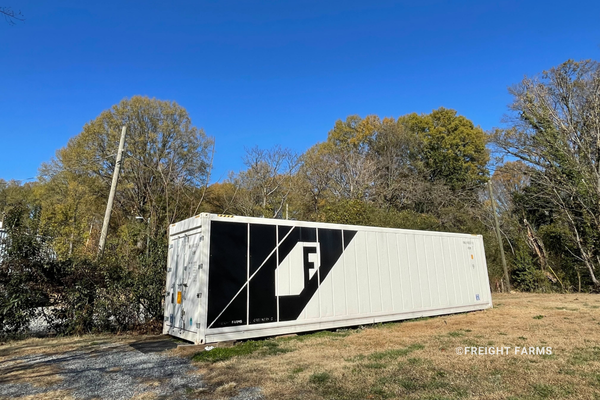Why Freight Farms Makes Pesticides a Thing of the Past
A Growing Concern in Traditional Farming
Pesticides have been a cornerstone of traditional agriculture, used to protect crops from pests and diseases. But their impact on health and the environment is increasingly under scrutiny. From chemical residues in food to harmful runoff polluting waterways, the "bad" of pesticides is clear. Yet, with Freight Farms' hydroponic solutions like the Greenery™, there’s a better way to grow—without pesticides.
The Problem with Pesticides
Pesticides have long been used to ensure high agricultural yields, but their downsides can’t be ignored.
Health Concerns: Pesticide residues on fruits and vegetables can pose risks to consumers, especially those most vulnerable, such as children.
Environmental Impact: Runoff from fields can contaminate water supplies and harm aquatic ecosystems.
Pest Resistance: Overuse can lead to pesticide-resistant pests, creating an endless cycle of dependency on chemical solutions.
Negative Effects on Soil Fertility: Excessive pesticide use can harm beneficial microorganisms in the soil, reducing its fertility and long-term health.
For farmers looking for alternatives, the path forward often seems unclear—until now.
Freight Farms: A Solution That Grows Beyond Pesticides
Freight Farms’ Greenery provides a controlled environment where crops flourish without the need for pesticides.
Here’s how:
Sealed, Controlled Environment: The Greenery is a completely enclosed hydroponic farming system, greatly reducing the risk of pests entering and wreaking havoc. No pests mean no need for chemical pesticides.
Hydroponic Precision: With hydroponics, plants are grown in nutrient-rich water rather than soil. This eliminates soil-borne diseases, one of the main reasons farmers rely on pesticides in traditional farming.
Consistent, Year-Round Growing: Seasonal changes often bring new pests and challenges. Freight Farms’ consistent indoor conditions ensure plants can thrive in every season without the risks associated with outdoor agriculture.
Cleaner, Safer Food: By removing the need for pesticides, Freight Farms helps growers deliver food that is safer and healthier for consumers. Plus, pesticide-free produce often commands a premium in the market, adding value for farmers.
Why Go Pesticide-Free with Freight Farms?
Choosing the Greenery is more than a way to grow food—it’s a way to grow sustainably and responsibly. Whether you're a first-time grower or an experienced farmer, the Greenery can adapt to your needs. It’s an especially powerful tool for traditional farms looking to diversify and enhance their operations. By incorporating the Greenery, farmers can complement their outdoor fields with a controlled indoor environment, producing high-value, pesticide-free crops year-round while maximizing their land’s potential.
Here are some key benefits:
Consumer Trust: Transparency about your growing process builds trust and loyalty with customers seeking clean, pesticide-free food.
Environmental Stewardship: Reduce your ecological footprint by eliminating chemical runoff and supporting biodiversity.
Cost Efficiency: Over time, cutting out pesticide expenses while maintaining high yields can improve your bottom line.
Your Next Steps to Growing Without Pesticides
The future of farming doesn’t rely on pesticides. With Freight Farms, you can join the movement toward clean, sustainable agriculture.
Explore the Greenery to see how it can transform your growing process.
Learn more about Freight Farms’ pesticide-free practices by scheduling a call with our team.
Discover how other farmers are succeeding without pesticides by reading more on our case study page or watching an on-demand webinar.
Let’s Grow Better Together
By choosing Freight Farms, you’re not just growing food—you’re growing a healthier future for people and the planet. Say goodbye to pesticides and hello to a better way to farm.
Ready to make the switch? Contact us today to learn more about how Freight Farms can help you grow pesticide-free.




